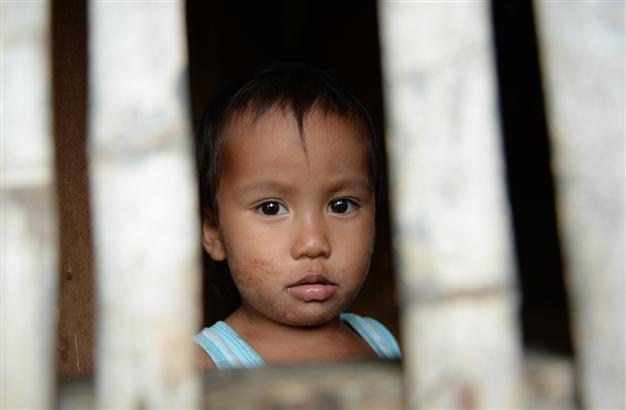Horror in Philippine child sex abuse village
IBABAO - Agence France-Presse

A child peers from a bamboo house, in the village of Ibabao, Cebu provnce in central Philippines. AFP photo
A remote Philippine village became the center of a horrifying child pornography ring as it was discovered that live footage of children was streamed online all across the world.The depraved scenes in the bungalow were being repeated in many homes throughout Ibabao, a secluded community on Cebu island where Internet child pornography had for some of its 5,000 residents become more lucrative than fishing or factory work.
“In the beginning I was shocked, I could not believe this was happening in my town,” mayor Adelino Sitoy told AFP last week, shortly after police announced they had cracked a global live-streaming paedophile ring in which Ibabao was a key source of the child pornography.
But while the typical close-knit rural Philippine village is currently in the spotlight, authorities and child rights advocates say child pornography is infecting many parts of the mostly poor Philippines.
Police and authorities said that behind the closed doors of the tiny wooden and brick homes, many parents directed their children for sex videos in front of webcams connected via the Internet to paying paedophiles overseas.
Tens of thousands children abused
Sitoy said the trade thrived because children were locked secretly inside homes, as well as Ibabao’s remote location and the fact some elected village leaders with relatives involved ignored the crimes.
But some of the videos eventually found their way into the computer files of a known British paedophile two years ago, triggering a global manhunt to track down the perpetrators. The British man was convicted in March last year and sentenced to eight years in prison.
Shortly afterwards police in the Philippines began carrying out raids in Ibabao and nearby areas with the help of British, Australian and U.S. authorities.
One of the raids in Ibabao saw dozens of Filipino police and social workers break into the bungalow next to the day care centre in September last year, arresting a couple and rescuing their three children, aged three, nine and 11.
Two days later, 13 other children who were being abused in other Ibabao homes were rescued, according to Philippine police.
Dutch advocate group Terre des Hommes estimates that “tens of thousands” of children are being abused through the cybersex industry just in the Philippines.
In announcing the dismantling of the paedophile network, Britain's National Crime Agency said in mid-January that 11 people had been arrested in the Philippines and 18 elsewhere around the world. Another 733 suspects were being investigated, the agency added.
Andrey Sawchenko, Philippine head of the Washington-based International Justice Mission (IJM) who helped in the arrests, said 39 children had been rescued in Ibabao and elsewhere in the Philippines.
But this is widely believed to be just the tip of the iceberg, with the British crime agency describing online child sex abuse as a "significant and emerging threat". "Extreme poverty, the increasing availability of high speed Internet and the existence of a vast and comparatively wealthy overseas customer base has led to organised crime groups exploiting children for financial gain," it said.
Dutch advocate group Terre des Hommes estimates that "tens of thousands" of children are being abused through the cybersex industry just in the Philippines. Last year, the group created a virtual 10-year-old Filipina girl that was deployed in Internet chat rooms to lure paedophiles.
Over 10 weeks, 20,000 people from 71 countries approached the fake girl asking for sexual performances, according to Terre des Hommes, which passed the details of the paedophiles onto police.
















